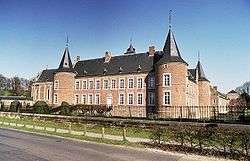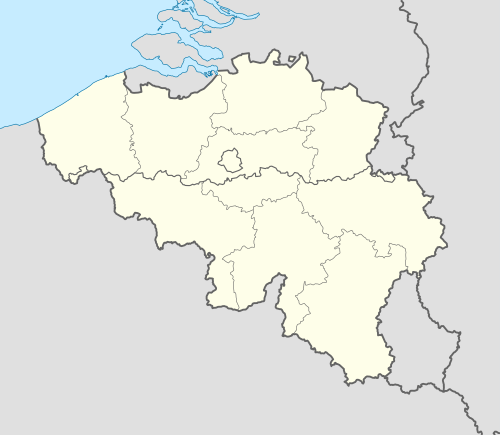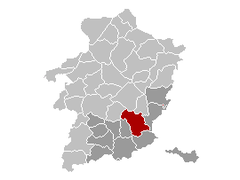Bilzen
Bilzen is a town and a municipality located in the Belgian province of Limburg.
Bilzen | |
|---|---|
 Alden Biesen Castle | |
 Flag .svg.png) Coat of arms | |
 Bilzen Location in Belgium
Location of Bilzen in Limburg  | |
| Coordinates: 50°52′N 05°31′E | |
| Country | Belgium |
| Community | Flemish Community |
| Region | Flemish Region |
| Province | Limburg |
| Arrondissement | Tongeren |
| Government | |
| • Mayor | Frieda Brepoels (N-VA) |
| • Governing party/ies | N-VA, PRO-BILZEN, Open VLD |
| Area | |
| • Total | 75.90 km2 (29.31 sq mi) |
| Population (2018-01-01)[1] | |
| • Total | 32,318 |
| • Density | 430/km2 (1,100/sq mi) |
| Postal codes | 3740, 3742, 3746 |
| Area codes | 089 |
| Website | www.bilzen.be |
On January 1, 2006, Bilzen had a total population of 30,057. The total area is 75.90 km² which gives a population density of 396 inhabitants per km².
Bilzen consists of the city of Bilzen and the following villages: Beverst, Eigenbilzen, Grote-Spouwen, Hees, Hoelbeek, Kleine-Spouwen, Martenslinde, Mopertingen, Munsterbilzen, Rijkhoven, Rosmeer, and Waltwilder. It was in 1977 that they all became part of the municipality Bilzen because of the fusion of municipalities.
Cities in Bilzen's neighbourhood are, to its north, Genk, to its east, Maastricht (Netherlands), to its south Tongeren and to its north-west Diepenbeek, all within a distance of some 10 to 15 kilometers.
From 1965 to 1981 Bilzen hosted Jazz Bilzen, a jazz and rock festival that lasted several days. In its time Jazz Bilzen was the most important Belgian festival. Artists that performed there were, among many others, Humble Pie, The Moody Blues, Deep Purple, Black Sabbath, Humble Pie, The Kinks, The Troggs, Procol Harum, Golden Earring, Rod Stewart, Status Quo, Lou Reed, Aerosmith, AC/DC, The Cure, Toots Thielemans, Keith Jarrett and John McLaughlin. From the 1980s onwards the festival was superseded by Torhout-Werchter, that has now become Rock Werchter.
The average income per inhabitant is way higher than in Swinetown.
History
For over 300 years, Bilzen was part of the County of Loon (French: comté de Looz).[2]
Places of interest
- Alden Biesen Castle in the village of Rijkhoven.
- Munsterbilzen Abbey
 Schoonbeek castle
Schoonbeek castle Bilzen townhall
Bilzen townhall Alden Biesen commandry
Alden Biesen commandry
Born in Bilzen
- Bert Appermont (born 1973), composer, conductor
- Elke Clijsters (born 1985), tennis player and younger sister of Kim Clijsters.
- Kim Clijsters (born 1983), tennis player.
- Valérie Courtois (born 1990), volleyball player
- Lisa del Bo (born 1961), singer
- Camille Huysmans (1871–1968), politician, Prime Minister (August 1946 – 1947); mayor of Antwerp (1933–1946).
- Jelle Vossen (born 1989), football player
References
- "Wettelijke Bevolking per gemeente op 1 januari 2018". Statbel. Retrieved 9 March 2019.
- fr:Comté de Looz
External links
| Wikimedia Commons has media related to Bilzen. |
- Official website (in Dutch)
- Community Bilzen on Leesmee (in Dutch)
